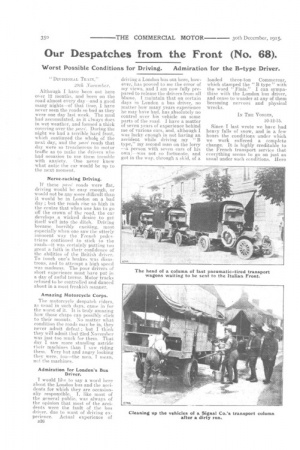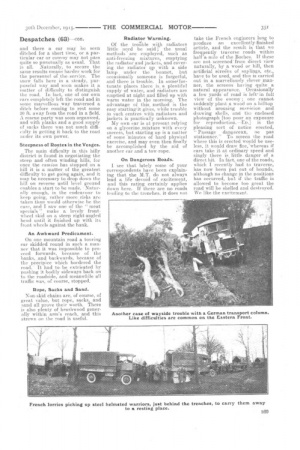Our Despatches from the Front (No. 68).
Page 26

Page 27

If you've noticed an error in this article please click here to report it so we can fix it.
Worst Possible Conditions for Driving. Admiration for the B-type Driver.
"DIVISIONAL TRAIN,"
29th November.
Although I have been out here over 12 months,. and been on the road almost every day—and a good many nights—of that time, I have never seen the road S so bad as they were one day last week. The mud had accumulated, as it always does in wet weather, and formed athick covering over the pare. During the night we had a terrible hard frost, which continued the Wholt dl the next day, and the pare roads that day were so treacherous to motor traffic as to make the drivers who had occasion to use them tremble with anxiety. One never knew what antic the car would be up to the next moment.
Nerve-racking Driving.
If these pave. roads were flat, driving would be easy enough, or would not be any more difficult than it would be in London on a bad day ; but the roads rise so high in the centre that when one has to go off the crown of the road, the car develops a wicked desire to get itself well into the ditch. Driving became horribly exciting, most especially when one saw the utterly innocent way the French pedestrians continued to stick to the roads—it was certainly putting too great a faith in their confidence of the abilities of the British driver. To touch one's brakes was disastrous, and to attempt a high speed was madness. The poor drivers of short experience must have put in a day of awful terror. Motor trucks refused to be controlled and danced about in a most freakish manner.
Amazing Motorcycle Corps.
The motorcycle despatch riders, as usual in such days, came in for the worst of it. It is truly amazing how those chaps can possibly stick to their mounts. No matter what condition the roads may be in, they never admit defeat ; but I think they will admit that 23rd November was just too much for them. That day I saw more standing astride their machines than I saw riding them. Very hot and angry looking they were, too—the men, I mean, net the machines.
Admiration for London's Bus Driver.
I would like to say a word here about the London bus and the accidents for which they are occasionally responsible. I. like most of the general public, was always of the opinion that most of the accidents were the fault of the bus driver, due to want of driving experience. Actual experience of B26 driving a London bus out here, however; has proved to inc the error of my views, and I am now fully-prepared to release•the drivers from all blame. I maintain that on certain days in London a bus driver, no matter how many years experience he may have had, has absolutely no control over his vehicle on some parts of the road. I have a matter of seven years of experience behind me -of various cars, and, although I was lucky enough in not having an accident while driving my " B type," my second man on the lorry —a person with seven cars of his own !—was not so fortunate, and got in the way, through a skid, of a loaded three-ton Commercar, which stamped the "B type" with the word `-` Finis." I can sympathise with the London bus driver, and cease to wonder at any -of them becoming nervouS and physical wrecks.
IN THE VOSGES, 10-12-1o.
Since -I last wrote we have had heavy falls of snow, and in a few hours the conditionsunder which we work suffered • a complete change. It is highly creditable to the French transport service that everything seems to go on just as usual under such conditions, Here and there a car may be seen ditched for a short time, or a particular car or convoy may not pass quite so punctually as usual. That is all. Naturally, to secure the same results means-harder.work for the personnel of the, service. The snow falls here in a steady, purposeful way and soon makes it a matter of difficulty to distinguish the road. In fact, one of our own cars completely loft the road and in some marvellous way traversed a ditch before coming to rest some 20 ft. away from the road in a field. A rescue party was soon organized, and with planks and a good supply of sacks there was not much difficulty in getting it back to the road under its own power.
Steepness of Routes in the Vosges.
The main difficulty in this hilly district is found in negotiating the steep and often winding hills, for once. the camion, has stopped, on a hill it is a matter of the greatest difficulty to get going again, and it may be necessary to drop down the hill on reverse until level ground enables a start to be made. • Naturally enough, in the endeavour to keep going, rather more risks are taken than would otherwise be the ease,. and I saw one of the " meat specials " make a lovely frontwheel skid on a steep right-angled bend until it finished up with its front wheels against the bank.
An Awkward Predicament.
On one mountain road a touring car skidded round in such a manner that it was impossible to proceed forwards, because of the banks, and backwards because of the precipice which bordered the road.It had tobe extricated by pushing it bodily sideways back on to the roadside, and meanwhile all traffic was, of course, stopped.
Rope, Sacks and Sand.
Non-skid chains are, of course, of great value, but rope, sacks, and sand all prove their worth. There is also .plenty of brushwood generally within arm's reach, and this strewn on the road is useful. Radiator Warming.
Of the trorible with radiators little need be said ; the usual methods are employed, suchas anti-freezing mixtures, emptying the radiator and jackets, and covering the radiator itp with a side lamp under the bonnet, but occasionally someone is forgetful, and there is trouble. In somelfortunate places .there is, a plentiful supply of water, and radiators are emptied at night and filled up with warm water in the morning. The advantage of this, method is the easy starting-it gives, while trouble
• in such centres with radiators and jackets is practically unknown. My own car is at present relying on a glyeerme,mixture with every success, but starting up is a matter of some minutes of hard physical exercise, and may even then finally be accomplished by the aid of another ear and a tow-rope.
On Dangerous Roads.
I see that lately some of your correspondents have been explainmg that the M.T. do not always lead a life devoid of excitement, and this rating certainly applies down here. If there are no roads 1-ading to the trenches, it does not take the French engineers long to produce an excellently-finished article, and the result is that we frequently traverse roads within half' a mile of the Boches. If these are not screened' from direct view naturally, by a wood or lull, then artificial seree-ns of saplings, etc., have to be used, and this is carried out in a marvellously clever .manner, the screens having quite a natural appearance. Occasionally a few yards' of road is left in full view of the enemy ; one cannot suddenly plant a wood on a hilltop without arousing siisnicion and drawing shells, and the enclosed photograph [too poor an exposure for reproduction.—EDJ is the pleasing sort of notice erected, Passage dangereux, ne pas stationner." To screen the road where this is erected would be useless, it would draw fir-e,'whereas if ears take it at ordinary speed and singly there is little . danger of a direct hit. In fact, one of the roads, which I recently had to traverse, has now been put out of bounds, although no change in the positions has occurred, but if the traffic: is allowed to become too great the road will be shelled and destroyed. We like the exeitenvint.








































